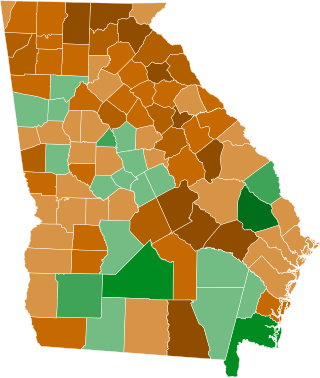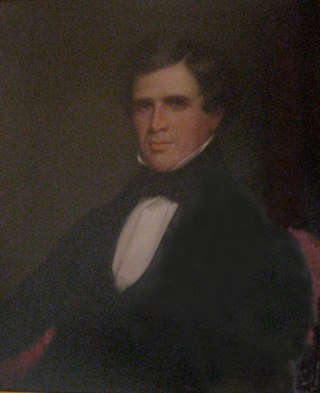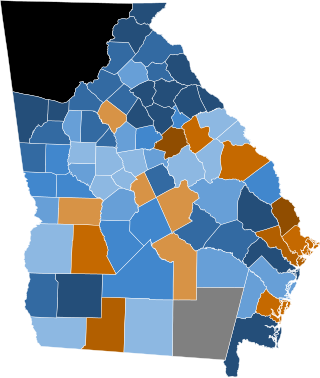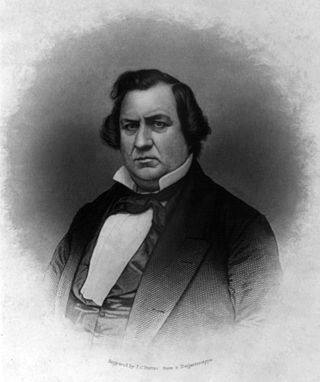The Whig Party was a conservative political party that existed in the United States during the mid-19th century. Alongside the slightly larger Democratic Party, it was one of the two major parties in the United States between the late 1830s and the early 1850s as part of the Second Party System. Four presidents were affiliated with the Whig Party for at least part of their terms. Other prominent members of the Whig Party include Henry Clay, Daniel Webster, Rufus Choate, William Seward, John J. Crittenden, and John Quincy Adams. The Whig base of support was centered among entrepreneurs, professionals, planters, social reformers, devout Protestants, and the emerging urban middle class. It had much less backing from poor farmers and unskilled workers.

The 1852 United States presidential election was the 17th quadrennial presidential election, held on Tuesday, November 2, 1852. Democrat Franklin Pierce defeated Whig nominee General Winfield Scott. A third party candidate from the Free Soil party, John P. Hale, also ran and came in third place, but got no electoral votes.
The Opposition Party was a third party in the South in the years just before the American Civil War.
Charles Dougherty was an American lawyer, jurist, and politician.

The Know Nothing movement was a nativist political movement in the United States in the mid-1850s. The national political organization of the Know Nothings was officially known as the "Native American Party" prior to 1855; thereafter, it was simply known as the "American Party". Members of the movement were required to say "I know nothing" whenever they were asked about its specifics by outsiders, providing the group with its colloquial name.

The 1854 Connecticut gubernatorial election was held on April 3, 1854. Former state legislator and Whig Party nominee Henry Dutton defeated former congressman and Democratic nominee Samuel Ingham and former congressman Charles Chapman with 31.89% of the vote.

The 1853 Connecticut gubernatorial election was held on April 4, 1853. Incumbent governor and Democratic Party nominee Thomas H. Seymour defeated former state legislator and Whig nominee Henry Dutton and former state legislator and Free Soil nominee Francis Gillette with 51.01% of the vote.

The 1851 Georgia gubernatorial election was held on October 6, 1851, to elect the governor of Georgia. Howell Cobb, nominee for the newly formed Constitutional Union Party, defeated the Southern Rights Candidate, Charles McDonald.

The 1843 Georgia gubernatorial election was held on October 2, 1843, to elect the governor of Georgia. Whig candidate George W. Crawford defeated the Democratic challenger Mark A. Cooper and was elected Governor.

The 1841 Georgia gubernatorial election was held on October 4, 1841, to elect the governor of Georgia. Incumbent Democratic Governor Charles McDonald won re-election defeating Whig State Rights candidate William C. Dawson.

The 1839 Rhode Island gubernatorial election was held on April 17, 1839.

The 1842 New Hampshire gubernatorial election was held on March 8, 1842.

The 1841 Vermont gubernatorial election was held on September 7, 1841.

The 1842 Vermont gubernatorial election was held on September 6, 1842.

The 1827 Georgia gubernatorial election was held on October 1, 1827, to elect the governor of Georgia. Due to the death of the Democratic-Republican Clark candidate Matthew Talbot, Jacksonian Troup candidate John Forsyth won in a landslide against a divided opposition.

The 1829 Georgia gubernatorial election was held on October 5, 1894, to elect the governor of Georgia. Jacksonian Troup Governor John Forsyth, first elected in the 1827 election, declined to seek re-election to a second term, instead aiming to be elected to the U.S. Senate. Jacksonian Troup candidate George Rockingham Gilmer, U.S House rep for Georgia's 1st congressional district, won in a landslide with the backing of both local parties.

The 1833 Georgia gubernatorial election was held on October 7, 1833, to elect the governor of Georgia. Incumbent Democratic Union Governor Wilson Lumpkin narrowly defeated National Republican Troup nominee Joel Crawford

The 1835 Georgia gubernatorial election was held on October 5, 1835, to elect the governor of Georgia. Democratic Union Governor Wilson Lumpkin, first elected in the 1831 election, did not seek re-election to a second term, instead he became U.S. commissioner to the Cherokee Native Americans. Democratic Union candidate William Schley, U.S House rep for Georgia's 1st congressional district, narrowly defeated Whig State Rights candidate Charles Dougherty.

The 1837 Georgia gubernatorial election was held on October 2, 1837, to elect the governor of Georgia. In a major upset, thanks in part to the Panic of 1837, Whig State Rights candidate and Ex-Governor George R. Gilmer beat incumbent Democratic Union Governor Willam Schley.

The 1853 Georgia gubernatorial election was held on 3 October 1853 in order to elect the Governor of Georgia. Democratic nominee and former United States Senator from Georgia Herschel V. Johnson defeated Constitutional Unionist nominee and former Attorney General of Georgia Charles J. Jenkins by a slim margin.


















